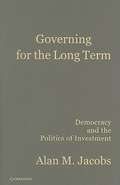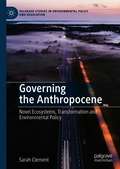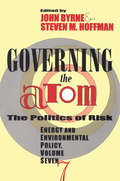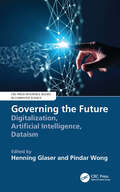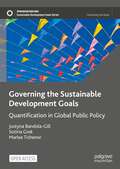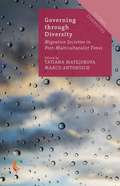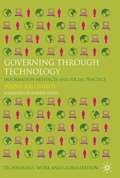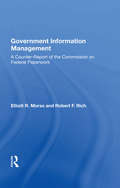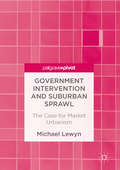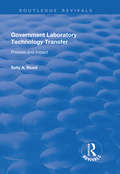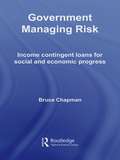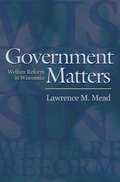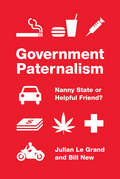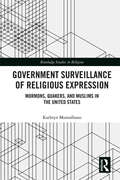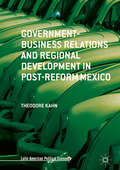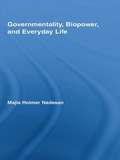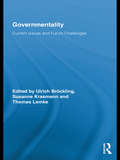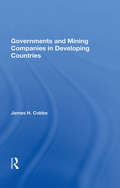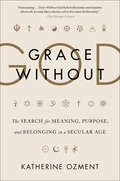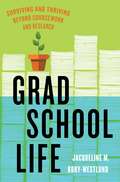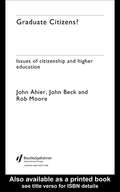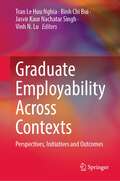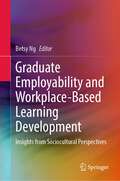- Table View
- List View
Governing for the Long Term
by Alan M. JacobsIn Governing for the Long Term, Alan M. Jacobs investigates the conditions under which elected governments invest in long-term social benefits at short-term social cost. Jacobs contends that, along the path to adoption, investment-oriented policies must surmount three distinct hurdles to future-oriented state action: a problem of electoral risk, rooted in the scarcity of voter attention; a problem of prediction, deriving from the complexity of long-term policy effects; and a problem of institutional capacity, arising from interest groups' preferences for distributive gains over intertemporal bargains. Testing this argument through a four-country historical analysis of pension policymaking, the book illuminates crucial differences between the causal logics of distributive and intertemporal politics and makes a case for bringing trade-offs over time to the center of the study of policymaking.
Governing the Anthropocene: Novel Ecosystems, Transformation and Environmental Policy (Palgrave Studies in Environmental Policy and Regulation)
by Sarah ClementThis book focuses on the present and future challenges of managing ecosystem transformation on a planet where human impacts are pervasive. In this new epoch, the Anthropocene, the already rapid rate of species loss is amplified by climate change and other stress factors, causing transformation of highly-valued landscapes. Many locations are already transforming into novel ecosystems, where new species, interactions, and ecological functions are creating landscapes unlike anything seen before. This has sparked contentious debate not just about science, but about decision-making, responsibility, fairness, and human capacity to intervene. Clement argues that the social and ecological reality of the Anthropocene requires modernised governance and policy to confront these new challenges and achieve ecological objectives. There is a real opportunity to enable society to cope with transformed ecosystems by changing governance, but this is notoriously difficult. Aimed at anyone involved in these conversations, be those researchers, practitioners, decision makers or students, this book brings together diffuse research exploring how to confront institutional change and ecological transformation in different contexts, and provides insight into how to translate governance concepts into productive pathways forward.
Governing the Atom (Politics Of Risk Energy Policy Studies #Vol. 7)
by John Byrne Steven M. HoffmanPromoted as a form of limitless, low-cost energy without the polluting effects of Its fossil fuel counterparts, nuclear power has enjoyed unparalleled support in several countries. Despite the development of an extensive set of policy and institutional mechanisms to foster its use. nuclear technology has been troubled by a wide range of problems and continues to pose risks many believe are far greater than society should accept. The legacy of failure ranges from catastrophic accidents like that at Chernobyl to the declaration of bankruptcy by the Washington Public Power Supply System. Governing the Atom explores why support for the technology remains substantial. The first part of this volume examines the social institutions that have accompanied the development of nuclear power. The second part details the numerous accommodations which have been required of society, beginning with the technology’s Impact on communities and geographic regions particularly affected by mining and milling. The technology’s inherent tendency towards "normal accidents” and the conflict between expert and public opinion on the dangers involved is examined, as are the on-going problems of waste disposal and decommissioning. The volume concludes with an examination of nuclear power developments in France, Germany. Russia and the Commonwealth of Independent States. Eastern Europe, Korea, and Japan. The volume provides a needed vehicle for the timely consultation and dissemination of current research on important energy policy issues. Governing the Atom provides insightful commentary regarding the initiation and development of nuclear technology. It will be of interest to policymakers, energy and environmental experts, sociologists and historians of technology, and all those interested in the problem of democracy in a technological society.
Governing the Future: Digitalization, Artificial Intelligence, Dataism (CRC Press Reference Books in Computer Science)
by Henning Glaser Pindar WongWe are living in times of deep and disruptive change. Perhaps the most powerful vector of this change can be described by three related catchphrases: digitalization, artificial intelligence, and dataism. Drawing on considerable expertise from a wide range of scholars and practitioners, this interdisciplinary collection addresses the challenges, impacts, opportunities and regulation of this civilizational transformation from a variety of angles, including technology, philosophy, cultural studies, international law, sociology and economics. This book will be of special interest to scholars, students, analysts, policy planners, and decision-makers in think tanks, international organizations, and state agencies studying and dealing with the development and governance of disruptive technologies.
Governing the Sustainable Development Goals: Quantification in Global Public Policy (Sustainable Development Goals Series)
by Sotiria Grek Justyna Bandola-Gill Marlee TichenorThis open access book conceptualises the Sustainable Development Goals as epistemic infrastructures that connect numbers, networks and governing paradigms.The book approaches quantification not merely as a tool for governing, but rather as a broader epistemic system through which global public policy is produced. This book focuses on the role of international organisations in shaping and implementing the 2030 Agenda and demonstrates how the SDGs have transformed and accelerated trends in quantification.
Governing the Urban in China and India: Land Grabs, Slum Clearance, and the War on Air Pollution (Princeton Studies in Contemporary China #10)
by Xuefei RenAn in-depth look at the distinctly different ways that China and India govern their cities and how this impacts their residentsUrbanization is rapidly overtaking China and India, the two most populous countries in the world. One-sixth of humanity now lives in either a Chinese or Indian city. This transformation has unleashed enormous pressures on land use, housing, and the environment. Despite the stakes, the workings of urban governance in China and India remain obscure and poorly understood.In this book, Xuefei Ren explores how China and India govern their cities and how their different styles of governance produce inequality and exclusion. Drawing upon historical-comparative analyses and extensive fieldwork (in Beijing, Guangzhou, Wukan, Delhi, Mumbai, and Kolkata), Ren investigates the ways that Chinese and Indian cities manage land acquisition, slum clearance, and air pollution. She discovers that the two countries address these issues through radically different approaches. In China, urban governance centers on territorial institutions, such as hukou and the cadre evaluation system. In India, urban governance centers on associational politics, encompassing contingent alliances formed among state actors, the private sector, and civil society groups. Ren traces the origins of territorial and associational forms of governance to late imperial China and precolonial India. She then shows how these forms have evolved to shape urban growth and residents’ struggles today.As the number of urban residents in China and India reaches beyond a billion, Governing the Urban in China and India makes clear that the development of cities in these two nations will have profound consequences well beyond their borders.
Governing through Diversity: Migration Societies In Post-multiculturalist Times (Global Diversities)
by Marco Antonsich Tatiana MatejskovaThis cross-disciplinary edited collection presents an integrated approach to critical diversity studies by gathering original scholarly research on ideational, technical and actual social dimensions of contemporary governance through diversity.
Governing through Technology
by Jannis KallinikosInformation produced and disseminated by an interlocking ecology of computer-based systems and artifacts currently provides the essential means for planning organizational operations and controlling organizational performances. This book describes the vital importance that digital information acquires in restructuring organizations.
Government Information Management: A Counterreport Of The Commission On Federal Paperwork
by Elliott R. MorssIn this timely critique of federal procedures, the authors identify the underlying causes of the current overload of information/paper-work in government and explain why the problem cannot be controlled until the causes are eliminated or neutralized. Using a calcuius they have developed for estimating the "value and "burden of federal information,
Government Intervention and Suburban Sprawl
by Michael LewynThis book shows how suburban sprawl is at least partially a consequence of government spending and regulation, and suggests anti-sprawl policies that can make government smaller and/or less intrusive. Thus, the book responds to the widely held view that automobile-dependent suburban development (also known as "suburban sprawl") is a natural result of the free market and of affluence, and accordingly cannot be altered without massive government regulation.
Government Laboratory Technology Transfer: Process and Impact (Routledge Revivals)
by Sally A RoodThis title was first published in 2000: Due to budget cuts and competitiveness pressures, determining the outcome of technology transfer from government R&D laboratories to private industry and entrepreneurial start-ups is of increasing interest. This book presents a series of case studies of successful technology transfer by examining the same list of topics for each case. It presents a format for analyzing the cases, topic by topic - a methodology that could be used by any R&D laboratory. The book also goes one step further and compares the cases that took place prior to national technology transfer legislation with those cases that took place after passage of such legislation. An additional feature is the summary of existing attempts to measure and evaluate technology transfer. This follows a backgroudn section on the technology policy context. The analysis finds that there is a significant commercial impact from government laboratory transfer using this approach.
Government Managing Risk: Income Contingent Loans for Social and Economic Progress (Routledge Studies in Business Organizations and Networks #Vol. 40)
by Bruce ChapmanHigher education rates are increasing throughout the Western world, yet at the same time, government budgets face increasing constraints. This has ensured that the importance of student support is recognized in many countries. In recent years there has been a world-wide movement towards the use of income contingent loans (ICL) for higher education. ICLs are now used in six countries following the Australian innovation of 1989, with the governments of many more countries looking very seriously at the model. This impressive new book by Bruce Chapman analyzes ICLs (particularly their use in supporting students), exploring the experiences of a number of other countries adopting them. Chapman presents analysis of a number of disparate case studies to illustrate how ICLs can aid risk management policy reforming in both progressive and administratively feasible ways. This book describes, examines and promotes an exciting new role for the public sector as a manager of risk, and argues that ICLs have enormous potential to change the extent and nature of social and economic activities. With the author's experience in the design and implementation of the Australian student financial support schemes, this is a knowledgeable, informative and enlightening book that will be useful to researchers, students and policy-makers alike.
Government Matters: Welfare Reform in Wisconsin
by Lawrence M. Mead"Good government" is commonly seen either as a formidable challenge, a distant dream, or an oxymoron, and yet it is the reason why Wisconsin led America toward welfare reform. In this book, Lawrence Mead shows in depth what the Badger State did and--just as important--how it was done. Wisconsin's welfare reform was the most radical in the country, and it began far earlier than that in most other states. It was the achievement of legislators and administrators who were unusually high-minded and effective by national standards. Their decade-long struggle to overhaul welfare is a gripping story that inspires hope for better solutions to poverty nationwide. Mead shows that Wisconsin succeeded--not just because it did the right things, but because its government was unusually masterful. Politicians collaborated across partisan lines, and administrators showed initiative and creativity in revamping welfare. Although Wisconsin erred at some points, it achieved promising policies, which then had good outcomes in terms of higher employment and reduced dependency. Mead also shows that these lessons hold nationally. It is states with strong good-government traditions, such as Wisconsin, that typically have implemented welfare reform best. Thus, solutions to poverty must finally look past policies and programs to the capacities of government itself. Although governmental quality is uneven across the states, it is also improving, and that bodes well for better antipoverty policies in the future.
Government Paternalism
by Julian Le Grand Bill NewShould governments save people from themselves? Do governments have the right to influence citizens' behavior related to smoking tobacco, eating too much, not saving enough, drinking alcohol, or taking marijuana--or does this create a nanny state, leading to infantilization, demotivation, and breaches in individual autonomy? Looking at examples from both sides of the Atlantic and around the world, Government Paternalism examines the justifications for, and the prevalence of, government involvement and considers when intervention might or might not be acceptable. Building on developments in philosophy, behavioral economics, and psychology, Julian Le Grand and Bill New explore the roles, boundaries, and responsibilities of the government and its citizens.Le Grand and New investigate specific policy areas, including smoking, saving for pensions, and assisted suicide. They discuss legal restrictions on risky behavior, taxation of harmful activities, and subsidies for beneficial activities. And they pay particular attention to "nudge" or libertarian paternalist proposals that try to change the context in which individuals make decisions so that they make the right ones. Le Grand and New argue that individuals often display "reasoning failure": an inability to achieve the ends that they set themselves. Such instances are ideal for paternalistic interventions--for though such interventions might impinge on autonomy, the impact can be outweighed by an improvement in well-being.Government Paternalism rigorously considers whether the state should guide citizen decision making in positive ways and if so, how this should be achieved.
Government Performance Management in China: Theory and Practice (China Academic Library)
by Bin WuThis book explains the basic concepts of the performance management, including the achievement of government goals, management capacity, administrative efficiency and policy effects. Taking Hangzhou, one of the largest cities in China, as an example, the book offers readers a new dimension through which the government can be understood and reformed—performance. Performance management has become an important component of public administration in China, and its use is beneficial in evaluating performance and social benefit. It also incentivizes civil servants to become more motivated and innovative, prevents the development of a bureaucratic atmosphere and facilitates communication between the public sector and the people. The book first introduces the concept of the performance management, providing a detailed description of its history, basic theories and its development. It then discusses the evolution of the system (from objective-based responsibility system evaluation to “vote for excellence”), its three basic areas (performance management on the national, local and municipal levels) and its key components: openness, democracy, accountability and performance. This book allows readers to gain a deeper understanding of the importance of government performance management in China and its contribution to the modernization of state governance and political legitimacy.
Government Surveillance of Religious Expression: Mormons, Quakers, and Muslims in the United States (Routledge Studies in Religion)
by Kathryn MontalbanoRecent revelations about government surveillance of citizens have led to questions about whether there should be better defined boundaries around privacy. Should government officials have the right to specifically target certain groups for extended surveillance? United States municipal, territorial, and federal agencies have investigated religious groups since the nineteenth century. While critics of contemporary mass surveillance tend to invoke the infringement of privacy, the mutual protection of religion and public expression by the First Amendment positions them, along with religious expression, comfortably within in the public sphere.This book analyzes government monitoring of Mormons of the Territory of Utah in the 1870s and 1880s for polygamy, Quakers of the American Friends Service Committee (AFSC) from the 1940s to the 1960s for communist infiltration, and Muslims of Brooklyn, New York, from 2002 to 2013 for suspected terrorism. Government agencies in these case studies attempted to understand how their religious beliefs might shape their actions in the public sphere. It follows that government agents did not just observe these communities, but they probed precisely what constituted religion itself alongside shifting legal and political definitions relative to their respective time periods. Together, these case studies form a new framework for discussions of the historical and contemporary monitoring of religion. They show that government surveillance is less predictable and monolithic than we might assume. Therefore, this book will be of great interest to scholars of United States religion, history, and politics, as well as surveillance and communication studies.
Government-Business Relations and Regional Development in Post-Reform Mexico (Latin American Political Economy Ser.)
by Theodore KahnThis book explores the political economy of subnational development in Mexico. Like much of Latin America, Mexico underwent market reforms and democratization in the late 20th century. In addition to transforming national institutions, these changes led to sharp political and economic divergence among Mexican states. The author offers a novel explanation for these uneven results, showing how relations between local governments and organized business gave rise to distinct subnational institutions for managing the economy. The argument is developed through a paired comparison of two states in central Mexico, Puebla and Querétaro. This work will be of interest to students of Latin American and Mexican politics, regional development, and government-business relations.
Governmentality, Biopower, and Everyday Life (Routledge Studies in Social and Political Thought #Vol. 57)
by Majia Holmer NadesanGovernmentality, Biopower, and Everyday Life synthesizes and extends the disparate strands of scholarship on Foucault's notions of governmentality and biopower and grounds them in familiar social contexts including the private realm, the market, and the state/military. Topics include public health, genomics, behavioral genetics, neoliberal market logics and technologies, philanthropy, and the war on terror. This book is designed for readers interested in a rigorous, comprehensive introduction to the wide array of interdisciplinary work focusing on Foucault, biopower and governmentality. However, Nadesan does not merely reproduce existing literatures but also responds to implicit critiques made by Cultural Studies and Marxist scholarship concerning identity politics, political economy, and sovereign force and disciplinary control. Using concrete examples and detailed illustrations throughout, this book extends the extant literature on governmentality and biopower and helps shape our understanding of everyday life under neoliberalism.
Governmentality: Current Issues and Future Challenges (Routledge Studies in Social and Political Thought)
by Ulrich BröcklingExamining questions of statehood, biopolitics, sovereignty, neoliberal reason and the economy, Governmentality explores the advantages and limitations of adopting Michel Foucault's concept of governmentality as an analytical framework. Contributors highlight the differences as well as possible convergences with alternative theoretical frameworks. By assembling authors with a wide range of different disciplinary backgrounds, from philosophy, literature, political science, sociology to medical anthropology, the book offers a fresh perspective on studies of governmentality.
Governments And Mining Companies In Developing Countries
by James H. CobbeThis book examines the relationship between the governments of less developed countries (LDCs) and foreign-owned firms engaged in the extraction of minerals for export. With an approach that synthesizes economic theory, technical considerations, and political factors, Cobbe provides a fresh look at the policy aspects of the "resource bargaining pro
Grace Without God: The Search for Meaning, Purpose, and Belonging in a Secular Age
by Katherine OzmentJournalist Katherine Ozment’s Grace Without God is a thought-provoking exploration of how secular Americans find fulfillment without organized religion.A Nautilus Gold Award Winner: Religion and Spirituality of Other TraditionsStudies show that religion makes us happier, healthier and more giving, connecting us to our past and creating tight communal bonds. Most Americans are raised in a religious tradition, but in recent decades many have begun to leave religion, and with it their ancient rituals, mythic narratives, and sense of belonging.So how do the nonreligious fill the need for ritual, story, community, and, above all, purpose and meaning without the one-stop shop of religion? What do they do with the space left after religion? With secularists swelling to one-fourth of American adults, and more than one-third of those under thirty, these questions have never been more urgent.Writer, journalist, and secular mother of three Katherine Ozment came face-to-face with this fundamental issue when her son asked her the simplest of questions: “what are we?” Unsettled by her reply—“Nothing”—she set out on a journey to find a better answer. She traversed the frontier of American secular life, sought guidance in science and the humanities, talked with noted scholars, and wrestled with her own family’s attempts to find meaning and connection after religion.Insightful, surprising, and compelling, Grace Without God is both a personal and critical exploration of the many ways nonreligious Americans create their own meaning and purpose in an increasingly secular age.
Grad School Life: Surviving and Thriving Beyond Coursework and Research
by Jacqueline M. Kory-WestlundGrad school isn’t easy. It’s even less easy when you’re also managing a second job, a family, or depression—or when you are a first-generation student, or if you come from an underrepresented group or a lower socioeconomic-status background. Grad students are overworked, overstressed, and over it.Most grad school advice books focus on the professional side: finding funding, managing research and teaching, and applying for academic jobs. But students today face a difficult job market. Only a handful will obtain coveted tenure-track professorships, so they need alternative career prep. Plus, grad school is only one part of your life. And with an average age of 33 years, today’s students are juggling far more than school.That’s where this book comes in. It will help you keep up a personal life, make the most of your time, and prepare for your career—whether in academia or beyond. This pragmatic book explains how to persevere through the grad school long haul, covering challenges both on and off campus. It shares candid, specific advice on personal finances, mental health, setting your own learning and career goals, maintaining friendships and relationships, and more.Peppy, sensible, and smart, Grad School Life points out the pitfalls of academia and helps you build the life you want. With fresh insights, concrete suggestions and exercises, and helpful lists of resources, this book gives grad students a new roadmap for not only surviving but thriving—both in school and in the real world.
Graduate Citizens: Issues of Citizenship and Higher Education
by John Beck John Ahier Rob MooreFollowing the introduction of student loans and tuition fees, the situation of students and new graduates has changed considerably. Set in this context, Graduate Citizens is a thought-provoking, and insightful look at the current generation of students' attitudes towards citizenship and matters of social and moral responsibility.Drawing on small-scale case studies of students in two universities, the authors explore students' changing sense of citizenship against the backdrop of recent changes in higher education. It addresses students' approaches to being in debt, the role of their families in providing support and their attitudes towards careers. Questioning the claim that the current generation of students is politically apathetic, this book shows that they are in fact socially concerned with, though distant from, official, mainstream politics. It investigates students' responses to such political and economic phenomena as globalisation and the ever-increasing promotion of market forces.Graduate Citizens illuminates and explores the links between reforms in higher education, student experience of university and issues of citizenship. It poses questions about the condition and future of citizenship in Britain and discusses the implications for citizenship education.
Graduate Employability Across Contexts: Perspectives, Initiatives and Outcomes
by Jasvir Kaur Nachatar Singh Tran Le Huu Nghia Binh Chi Bui Vinh N. LuThis book explores stakeholders’ perspectives, their practices, and engagement with enacting the employability agenda in the context of a rapidly changing world. It explains the need for developing graduate employability under socioeconomic, cultural, and political pressure exposed to the higher education sector. Largely framed within Bourdieu’s concepts of social field, habitus, and capital, it explores international stakeholders’ perspectives and experiences with graduate employability agenda in different contexts, which serves as a point of reference for the adoption of such initiatives. Based on empirical evidence, the authors develop a new graduate employability framework seeing it as a lifelong process, denote the relationships between types of employability capital, and shed light on the consequences of different strategies to translate employability capital to employment and career outcomes. Overall, this book generates both theoretical and practical insights which help to advance employability programs, better prepare the future workforce, and anticipate turbulence in the labour markets.
Graduate Employability and Workplace-Based Learning Development: Insights from Sociocultural Perspectives
by Betsy NgThis book presents a comprehensive discussion of sociocultural perspectives on graduate employability and workplace-based learning development. It draws on Vygotsky’s theories such as situated learning and sociocultural perspectives, as well as the constructivist learning theory. This book showcases theoretical and empirical analyses that show how institutions, decision-makers or academics can work together to enhance job employability in this age of uncertainty. It discusses issues such as the development of emerging and employability skills, examines research in higher education and workplace-based learning development, and proposes directions for the changing nature in real-world settings. This book details empirical research in the field using quantitative, qualitative and mixed method approaches, and summarizes the key conclusions pertaining to graduate employability skills as well as workplace learning culture and technology-mediated environment. It includes contributions from experienced international scholars, and offers detailed insights for readers who want a timely understanding of research trends in graduate employability and workplace-based learning development.
